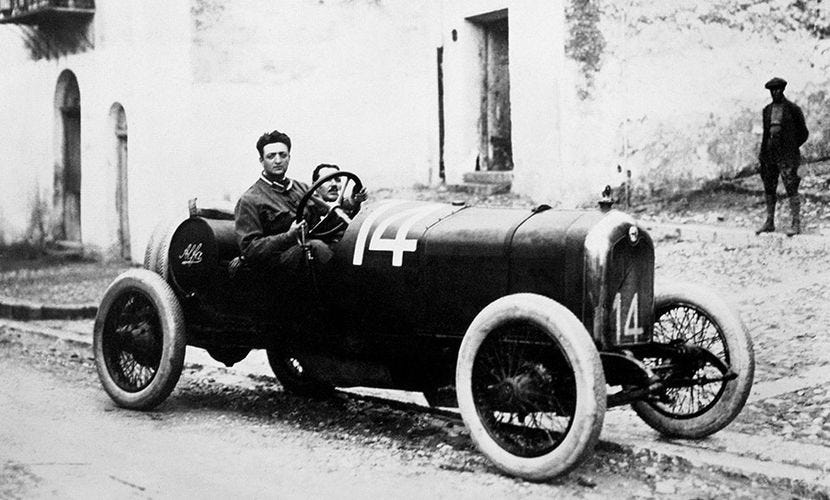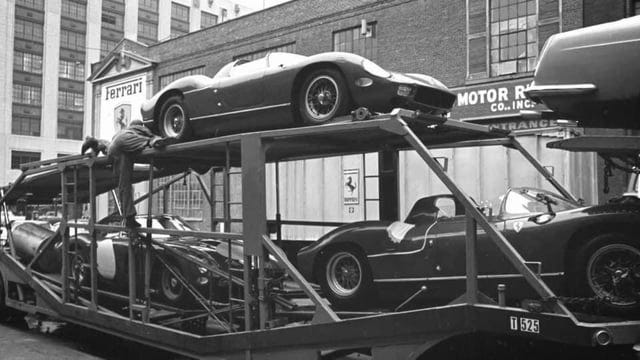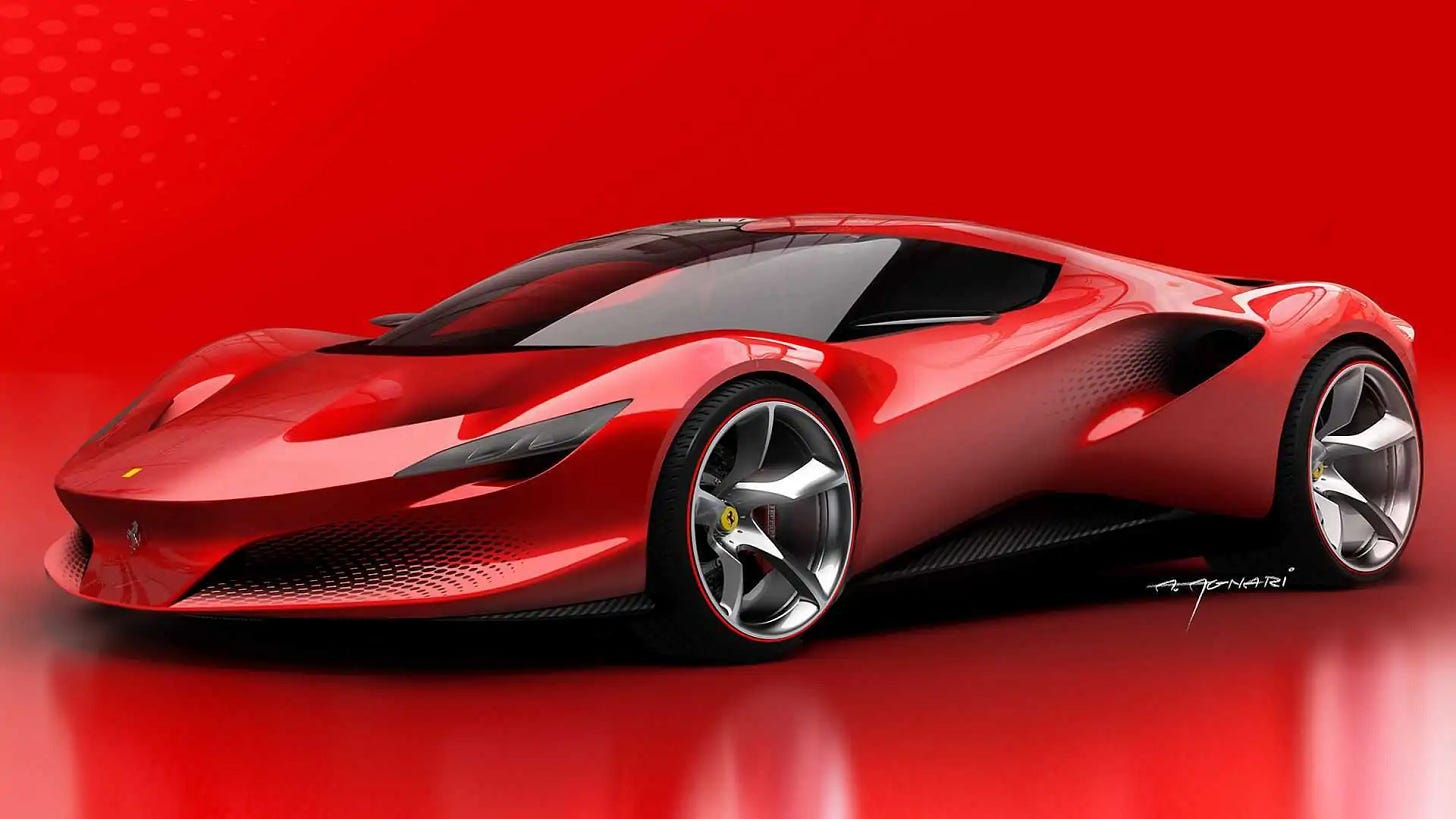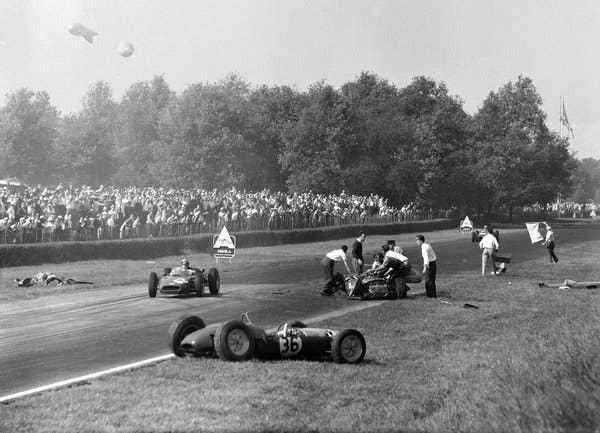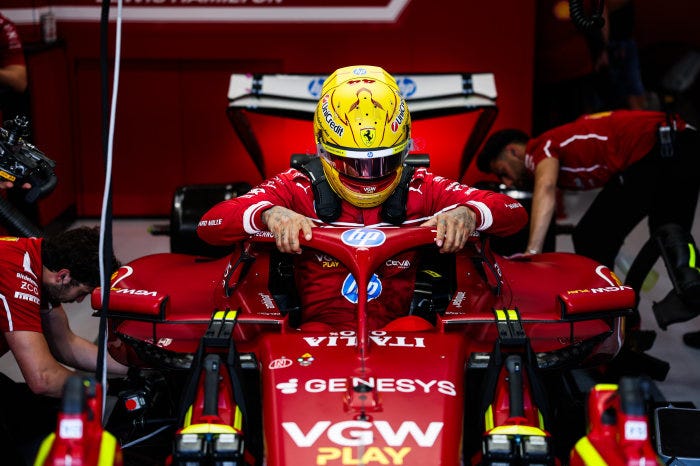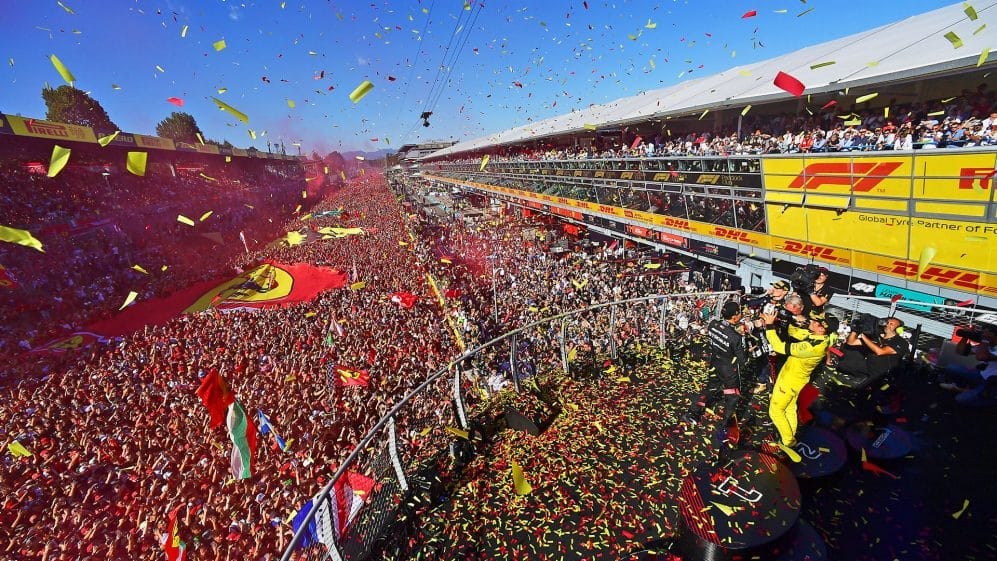🏎️ What Ferrari Taught Me on a Boring Flight
A forgotten documentary, a brutal stat, and the one lesson every startup founder needs to hear — especially when things get hard.
This week brought some welcome relief: calmer markets, upbeat earnings, and a few positive geopolitical signals. Meta and Microsoft exceeded expectations, reminding everyone that leading tech players remain resilient — even in the face of tariff threats. The U.S. and Ukraine also signed a natural resources deal, which could open up new strategic opportunities. Overall, a good week. That said, we’re still cautious — the underlying tensions haven’t disappeared, and some backlash could still be ahead.1
Whenever the topic of tariffs resurfaces, car imports are the classic example. It makes sense — cars aren’t just industrial goods. They’re symbols. Of national pride, of status, of identity. They sit right at the intersection of globalization, design, and political friction.
It was in this context that I stumbled across something striking: the staggering difference in gross margin and P/E ratios between Ferrari (28% | 66x) and Mercedes (10% | 4x) The numbers are brutal 😳. And they triggered a vivid memory.2
…
Roughly 13 years ago, on a domestic U.S. flight after the financial crisis — a time when our own companies were nowhere near stability, let alone success — I had already seen all the good movies. Out of pure boredom, I ended up watching a documentary on Ferrari. I’ve never forgotten it.
It’s a reminder of what really matters to make the difference — especially in a world where politics, AI, and global competition keep rewriting the rules.
Here is why.
The Man Behind the Myth: Enzo Ferrari’s Humble Beginnings
Born in 1898 in Modena, Italy, Enzo Ferrari grew up surrounded by machines. His father owned a small metal fabrication business, and it was clear from an early age that Enzo was fascinated by mechanical engineering. However, tragedy struck early: Enzo lost both his father and brother to illness during a flu outbreak in 1916. Forced to abandon formal education, he worked odd jobs, eventually finding his way into the nascent world of automobile racing.
After serving in World War I and surviving a bout of severe illness himself, Ferrari started as a test driver at CMN (Costruzioni Meccaniche Nazionali). His real breakthrough came in 1920 when he joined Alfa Romeo as a race driver. It was during this time that he began dreaming of running his own team, but it would take years of patience, learning, and strategic maneuvering.
Racing First, Cars Second
In 1929, Enzo Ferrari founded Scuderia Ferrari as the racing division for Alfa Romeo. Initially, Ferrari wasn’t interested in manufacturing road cars. His passion was singular: winning races. However, after severing ties with Alfa Romeo in 1939, and amidst the aftermath of World War II, Enzo had to adapt.
In 1947, the first car to bear his name, the 125 S, rolled out of the Maranello factory. Even then, Ferrari saw road cars as a means to fund his racing ambitions. He was not chasing the mass market; he was chasing excellence, and those who recognized it.3
*no need to worry about breadcrumbs or avocado (😳) on the leather interior.
Cracking America: A Strategic Leap
Ferrari’s early success in Europe was impressive, but he understood something that many European entrepreneurs at the time missed: the future market was the United States.
Through a fateful partnership with Luigi Chinetti, a former racer who had emigrated to the U.S., Ferrari found his American champion. Chinetti convinced Enzo to let him sell Ferraris in the U.S., and in 1954 he opened the first official Ferrari dealership in New York City.
This move changed everything. Wealthy American enthusiasts, captivated by Ferrari’s racing pedigree and unparalleled design, flocked to the brand. Ferrari became not just a car manufacturer, but a maker of dreams. The U.S. market gave Ferrari the financial fuel it needed to dominate motorsports and build increasingly advanced machines.4
The Unseen Struggles: Resilience Behind the Legend
Building Startups based on AI technology, speed is core. What you read in the press are success stories. But keep in mind, even behind iconic brands lies a mountain of hidden challenges, and Ferrari was no exception. Enzo’s journey was anything but smooth. For decades, Ferrari faced:
Chronic Financial Problems: Despite the prestige, Ferrari often struggled to make consistent profits. The cost of racing, combined with the expense of producing high-performance vehicles in low volumes, drained resources. Profits were thin or nonexistent for long stretches. - When passion wins over reason, I guess.
Quality Issues: In the early years, Ferrari vehicles, while mechanically brilliant, suffered from reliability problems. Maintaining the brand’s reputation for excellence required constant, painful improvements. - Still the case today. Ferrari will unveil its first fully electric car in October 2025. And they’ve already said it will come with a specially engineered sound. Curious how that will sound.
Personal Losses: Beyond the early death of his father and brother, Enzo faced the devastating loss of his beloved son Dino in 1956. Dino’s death from muscular dystrophy at just 24 years old profoundly affected him and added a personal grief that shaped his famously distant and stoic demeanor.
Ferocious Competition: Ferrari was never alone on the racetrack or in the market. Legendary battles against Maserati, Jaguar, Ford (famously culminating in the Ford vs Ferrari wars at Le Mans - Ford won), and later Porsche pushed Ferrari to its limits. Copy cats? - never heard of
Internal Struggles: Enzo’s perfectionism often led to tense relationships within his company. Key engineers and designers, frustrated by his authoritarian management style, left Ferrari to form rival companies like Lamborghini. You’re not the perfect boss? Relax. As an entrepreneur you are a team player — not a weekend career coach reading up on ‘how to lead.’ You build.5
Despite all this, Ferrari persisted. Enzo understood something essential: resilience is not a choice but a necessity. In entrepreneurship, failure isn’t an exception - it’s the rule. And most of most successful founders have not been perfect bosses. BTW: There’s no such thing as a perfect boss. Just keep improving.
It took years of learning, rebuilding, and relentless improvement for Ferrari to become profitable and secure its place at the summit of the automotive world.
This chapter of Enzo Ferrari’s life is a powerful reminder for every founder:
Setbacks are Normal: Problems aren’t signs you’re failing - they’re signs you’re building something meaningful.
Stay the Course: The world celebrates success stories but often forgets the long years of invisible struggle that built them.
Resilience is Everything: In the end, those who endure are the ones who triumph. Or in Paul Graham’s words: a company stays alive as long as the founders don’t give up.6
The Secret of Ferrari’s Brand Power: What Enzo Built That Others Couldn’t Copy
Today, many brands try to position themselves as “luxury,” but few achieve what Ferrari has: a global aura of legend and desire. Mercedes, Porsche, even Aston Martin - they all build great machines. Yet Ferrari stands apart. Why?
Because Ferrari is not a car brand. Ferrari is a story — and that story began with its founder Enzo.
Enzo Ferrari never set out to be a luxury brand. He set out to win races. That purity of purpose — to push the limits of what was possible — built the foundation for a brand rooted in performance, scarcity, emotional obsession, and an almost mythical identity. Let’s break it down:
1. Racing First – Ferrari’s DNA is motorsport. From the first day, Enzo cared more about the podium than the showroom. That dedication to performance infused everything. Winning wasn’t marketing, it was survival. Every Ferrari road car existed to fund the racing dream. – Just like Enzo’s unwavering focus on racing, startup founders often begin with a singular vision. However, the path to success frequently requires adaptability. The initial idea is rarely the one that leads to triumph. It’s through continuous iteration and responsiveness to feedback that startups find their true course.
As highlighted by Bentley University’s Entrepreneurship Hub, 40% of startup founders pivoted to avoid failure, and those who did so thoughtfully achieved success 75% of the time.7
2. Scarcity as Strategy – Enzo famously said, “We will always sell one car fewer than the market demands.” That scarcity made owning a Ferrari a status symbol — not because of price, but because of access. It created longing, patience, and pride.
3. Emotional Resonance – Ferrari doesn’t advertise like others. Its red color, its engine sound, its Le Mans legacy — these are cultural artifacts, not features. Owning a Ferrari is an identity, not a transportation choice.
Nice read: Lewis Hamilton Plus Ferrari Was a Match Made in F1 Heaven. Well, Not So Fast. The marriage has been rockier than anyone expected, at least on the track8
4. No Compromise – Enzo rejected ideas that diluted brand integrity. He limited dealer power, refused mass production, and didn’t chase trends. The brand today still protects that legacy. Modifying a Ferrari? Risk being banned from buying the next one.
5. Continuity with Vision – Even as the brand evolves — with fashion lines, hybrid drivetrains, and upcoming EVs — the red thread remains: exclusivity, excellence, and emotional gravity. The factory in Maranello still follows a script written by a man who refused mediocrity.
“You cannot describe passion, you can only live it.” — Enzo Ferrari(And that’s as true for building startups as it is for building engines.)
For founders and brand builders, the lesson is clear: you cannot fake legacy. But you can build one — through obsession, through craft, through daring to be misunderstood for decades. Take UI/UX seriously. Turn Your Customers into Fans.
That’s it. Drop a comment below or email me directly: fabian@studioalpha.capital.
Let’s create the future.
Fab 🏍️
Sources
https://www.ft.com/content/1ae70f6c-6651-46e4-bc14-cfd6befc1474
Enzo Ferrari: https://fr.wikipedia.org/wiki/Enzo_Ferrari?utm_source=chatgpt.com; https://www.wired.com/2011/02/0218enzo-ferrari-born/?utm_source=chatgpt.com
BTW: Do you know the movie “Horrible Bosses”?
https://www.bentley.edu/centers/entrepreneurship-hub/pivoting?utm_source=chatgpt.com
https://www.wsj.com/sports/ferrari-f1-lewis-hamilton-8ecafbee?mod=saved_content








